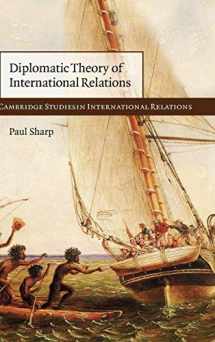
Diplomatic Theory of International Relations (Cambridge Studies in International Relations, Series Number 111)
ISBN-13:
9780521760263
ISBN-10:
0521760267
Author:
Paul Sharp
Publication date:
2009
Publisher:
Cambridge University Press
Format:
Hardcover
352 pages
Category:
International & World Politics
,
Politics & Government
FREE US shipping
Book details
ISBN-13:
9780521760263
ISBN-10:
0521760267
Author:
Paul Sharp
Publication date:
2009
Publisher:
Cambridge University Press
Format:
Hardcover
352 pages
Category:
International & World Politics
,
Politics & Government
Summary
Diplomatic Theory of International Relations (Cambridge Studies in International Relations, Series Number 111) (ISBN-13: 9780521760263 and ISBN-10: 0521760267), written by authors
Paul Sharp, was published by Cambridge University Press in 2009.
With an overall rating of 4.1 stars, it's a notable title among other
International & World Politics
(Politics & Government) books. You can easily purchase or rent Diplomatic Theory of International Relations (Cambridge Studies in International Relations, Series Number 111) (Hardcover) from BooksRun,
along with many other new and used
International & World Politics
books
and textbooks.
And, if you're looking to sell your copy, our current buyback offer is $0.3.
Description
Diplomacy does not take place simply between states but wherever people live in different groups. Paul Sharp argues that the demand for diplomacy, and the need for the insights of diplomatic theory, are on the rise. In contrast to conventional texts which use international relations theories to make sense of what diplomacy and diplomats do, this book explores what diplomacy and diplomats can contribute to the big theoretical and practical debates in international relations today. Sharp identifies a diplomatic tradition of international thought premised on the way people live in groups, the differences between intra- and inter-group relations, and the perspectives which those who handle inter-group relations develop about the sorts of international disputes which occur. He argues that the lessons of diplomacy are that we should be reluctant to judge, ready to appease, and alert to the partial grounds on which most universal claims about human beings are made.


We would LOVE it if you could help us and other readers by reviewing the book
Book review

Congratulations! We have received your book review.
{user}
{createdAt}
by {truncated_author}


